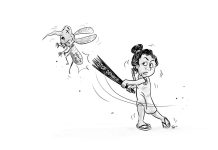
I HAVE always thought that drivers who are working under the “boundary” system are more of businessmen rather than employees, but I learned from my friend Atty. Roger Evasco that there is actually a court decision saying that they are in fact employees, meaning to say that there is in fact an “employer-employee” relationship between the operators and the drivers.
For all intents and purposes, I am inclined to defer to the court ruling, even if I found it rather strange, because based on my direct observation, operators are actually renting out their vehicles to the drivers who are simply renting them.
Thanks to Prof. Louie Montemar who is another friend, he explained to me that the bone of contention is really who controls the “means of production”, and it is very clear in this example that the operators do.
In contrast to the model of the “boundary system”, the transport network vehicle services (TNVS) companies like Grab and Uber do not control the “means of production” so to speak, but instead they are controlling the “means of information” in a manner of speaking.
In other words, it could be said that the drivers are the ones who are controlling the “means of production”, if and when they are the owners of the cars that they are driving.
The story is different whoever if and when the cars are owned by other people. In that case, these “other people” could not even be called “operators”, because based on their business model; the TNVS companies are the ones who are practically functioning as the “virtual” operators. Of course, it is very clear that there is no “employee-employer” relationship between the TNVS companies and the drivers.
In the definition explained to me by Prof. Montemar, it is implied that all those who are working for the employers are in effect the “workers”, simply because they do not own the “means of production”. In this case, it is clearly implied that all those who are working above the levels of the “workers” are considered as “managers”, even if they too do not own the “means of production”. For all intents and purposes however, I would be willing to agree that these ‘managers” could still be considered as “retired workers”, because all of them started as “workers” in the first place. I guess that would be the same as saying that retired soldiers could already be considered as civilians and stretching the definition further, they could be considered as “retired government workers”.
I graduated with a political science degree in college, but I never really call myself a political scientist. Prof. Montemar however is a real political scientist, and that is why I seek him out to talk about the deeper side of politics, so to speak.
I told him that both democracy and communism are failed experiments, pointing out that some communist countries have become capitalist, and some supposedly democratic counties have become socialist, seemingly bordering on communism.
I also shared with him my observation that communism is both a political and an economic system rolled into one, whereas democracy and capitalism function separately from each other, democracy being the political system and capitalism being the economic system.
At that point, he told me that the founding fathers of the original 13 states did not intend capitalism to be separate from democracy, because as a matter of fact they wanted capitalism to be a tool of democracy for the good of the people.
In a matter of speaking, it could be said that capitalism actually went rouge, and that is why some writers are calling it “runaway capitalism”, referring to a system that has ran out of control. In theory therefore, it is highly possible that capitalism could “come back to the fold”, and serve the goals of democracy as it was originally meant to be.
In support of that notion, Prof. Montemar told me that barangays could actually be run as cooperatives, very much similar to the kibbutz in Israel that are run in such a way that the political system and the economic system are rolled into one.
Obviously, Israel is not a communist country, but it is also obvious that in their case, capitalism has not gone rouge. As a matter of fact, it could be said that in the case of Israel, business and industry are serving the purposes of the State, in terms of national defense and national security.
While studying about cooperatives, I can across some examples wherein they would actually own the “means of production” because the members are actually the members themselves. In such cases, it could be said that there is no employer-employee relationship because the members are actually working for themselves, being actually the owners of their own business.
Since these cooperatives are following the “one man-one vote” rule, it could be said that they are actually following the democratic system, even if they are also following the capitalist system.
By some stretch of the imagination it could still be argued that these members could still be considered as “workers”, but in reality that would appear to be more of a figure of speech, because the bottom line is that they own the “means of production”./PN







